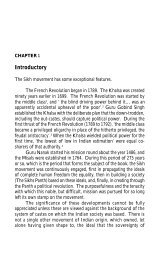Fundamentalism and the Sikh Religious Tradition by T.N. Madan
Fundamentalism and the Sikh Religious Tradition by T.N. Madan
Fundamentalism and the Sikh Religious Tradition by T.N. Madan
You also want an ePaper? Increase the reach of your titles
YUMPU automatically turns print PDFs into web optimized ePapers that Google loves.
what it is." Dr. McLeod has for long years been a part of <strong>the</strong> Christian Mission at Batala<br />
(India). Similarly, Oberoi's papers have also evoked comments which are <strong>by</strong> no means<br />
complimentary, both about his knowledge of <strong>the</strong> <strong>Sikh</strong> religion <strong>and</strong> his academic<br />
credibility, as commented upon <strong>by</strong> Dhillon in his published paper presented at Los<br />
Angeles in 1988 :<br />
"Oberoi while he gives irrelevant details of <strong>the</strong> miraculous powers attributed to<br />
Sakhi Sarvar <strong>and</strong> lavishly quotes Rose as evidence, seems to have deliberately concealed<br />
<strong>the</strong> above mentioned conclusion drawn <strong>by</strong> Rose <strong>and</strong>, instead has made <strong>the</strong> distortion that<br />
Singh Sabha leaders were <strong>the</strong> first to object to such practices. Such clear misstatements<br />
are generally made <strong>by</strong> partisan propag<strong>and</strong>ists, but never, we believe, <strong>by</strong> any academician.<br />
This indicates ei<strong>the</strong>r a lack of indepth study or a conscious attempt to suppress facts with<br />
a view to misrepresenting <strong>Sikh</strong>ism."<br />
<strong>Madan</strong> calls Oberoi a careful scholar. Dhillon's observations clearly suggest that<br />
in order to draw a wrong inference he went to <strong>the</strong> extent of making a suppression of<br />
known, important <strong>and</strong> relevant material. Apart from being selective in his secondary<br />
sources, he hardly appears to be up-to-date in considering <strong>the</strong> material which he employs<br />
for his assessment. For example, more than three papers commenting on <strong>the</strong> writings of<br />
Oberoi, were read, <strong>and</strong> later published, at <strong>the</strong> Seminars, held at long Beach, <strong>and</strong> at<br />
Vancouver in <strong>the</strong> University of British Columbia. Dr. Noel Q. King, Professor Emeritus,<br />
University of Californis, Santa Cruz, read a paper "<strong>Fundamentalism</strong>, Modernity; <strong>Sikh</strong>ism<br />
: A Tertium Quid", in which he discussed Oberoi's views, <strong>and</strong> drew two emphatic<br />
conclusions, namely, first, that <strong>Sikh</strong>ism is not a <strong>Fundamentalism</strong> in any sense, but is a<br />
third path with an identity of its own, <strong>and</strong>, second, that <strong>the</strong>re is complete unity between<br />
<strong>the</strong> thought of Guru Nanak <strong>and</strong> that of <strong>the</strong> later nine Gurus.<br />
It would appear that in <strong>the</strong> assessment <strong>and</strong> views of <strong>Madan</strong> <strong>the</strong>re are evident<br />
faults of underst<strong>and</strong>ing <strong>and</strong> in <strong>the</strong> choice of material <strong>and</strong> method.<br />
V. CONCLUSION<br />
We have endeavoured to explain that <strong>the</strong> real problem today related to <strong>the</strong> failure<br />
of Secularism to evolve a rational ethics. The whole-life religions have always felt that<br />
Secularism alone can nei<strong>the</strong>r evolve a viable ethics, nor deliver goods in <strong>the</strong> empirical<br />
field, because in <strong>the</strong> world of cause <strong>and</strong> effect, <strong>the</strong>re is no element of freedom or<br />
creativity, which can furnish societal cohesion, or be <strong>the</strong> base of moral life of man. On<br />
<strong>the</strong> o<strong>the</strong>r h<strong>and</strong>, dichotomous religions <strong>and</strong> Secularism believe that religion should remain<br />
aloof from <strong>the</strong> empirical life. Withdrawal, asceticism, sanyasa <strong>and</strong> monasticism are <strong>the</strong><br />
direct consequence of this approach. Like St. Augustine, <strong>the</strong>se religious ideologies<br />
virtually leave <strong>the</strong> earthy city of self-will to stew in its own juice. But whole-life or miripiri<br />
religions clearly take up <strong>the</strong> challenge of evil in life. They stress that evil <strong>and</strong><br />
injustice, being facts of life, <strong>and</strong> being more so in <strong>the</strong> socio-political field, <strong>the</strong> man of<br />
God should not run away from <strong>the</strong> challenge, but should accept <strong>the</strong> responsibility of<br />
meeting it <strong>and</strong> removing inequity. For <strong>the</strong>m God being Love, <strong>the</strong>y have to be His<br />
instruments in <strong>the</strong> expression of that Love <strong>and</strong> in battling with injustice <strong>and</strong> oppression,<br />
wherever it be, <strong>and</strong> whatever be <strong>the</strong> cost. Although dichotomous religions are generally<br />
pacificists <strong>and</strong> have a different view, yet we have seen that whe<strong>the</strong>r it is a Mahatma<br />
G<strong>and</strong>hi from Hinduism, or a Niebuhr, a Moltmann, a Cutierrez, a Fa<strong>the</strong>r Torres, or <strong>the</strong><br />
Liberation <strong>the</strong>ologians from Christianity, <strong>the</strong>y are coming to <strong>the</strong> view that Godliness<br />
must in practice involve both participation in <strong>the</strong> socio-political life <strong>and</strong> <strong>the</strong> use of
















